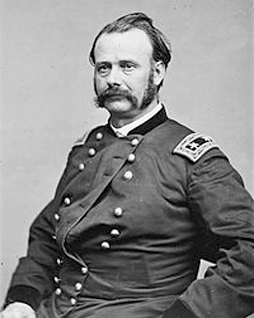|
Kentucky’s Civil War leaders…
Rousseau best remembered for Alaska role,
confrontation with Iowa congressman
(EDITOR’S NOTE: This is the 21st in a series about Kentucky’s officers and battle leaders during the Civil War.)
Union Major Gen. Lovell Harrison Rousseau had an impressive career as an officer, politician and lawyer, but always will be best known for playing a key role in the transfer of Alaska from Russia to the United States.
As a brigadier general in the regular Army, the Stanford-born Rousseau was assigned to duty in Alaska in March 1867. His pro-transfer efforts led to completion of the project on Oct. 18 of that year, now celebrated as Alaska Day.
Rousseau also will be remembered for his role in the Battle of Perryville when he commanded a division that repulsed a Confederate attack on the afternoon of Oct. 8, 1862. The general successfully ran for the Indiana House of Representatives as a Whig candidate in 1844, and, in 1845, was commissioned as a captain in the Mexican-American War and charged with raising a company of volunteers. He led them at the Battle of Buena Vista where he helped rally routing Indiana troops at a key point in the battle. When Rousseau returned from the war, he successfully gained a seat in the Indiana Senate, and continued to run a successful law practice. After relocating to Louisville, he served in the Kentucky Senate from 1860-61.
On the verge of the Civil War, Rousseau took a bold and decided stand in favor of maintaining state government in Kentucky and helped keep it from seceding from the Union. He resigned from his seat in the senate in June 1861 and applied for a commission to raise volunteers. Against the opposition of many prominent figures in Kentucky, he succeeded in raising two regiments composed entirely of Kentuckians at Camp Joe Holt, across the Ohio River from Louisville in Jeffersonville. They were known as the Louisville Legion. With the help of a battalion of the Louisville Home Guard, the regiments saved Louisville from being captured by Confederate troops. Rousseau was appointed colonel of the 5th Kentucky Volunteer Regiment in September 1861 and was later promoted to brigadier general of Volunteers attached to the army of General Ormsby M. Mitchel. Later, Rousseau was once again promoted to major general of Volunteers. He served valiantly at the Battles of Shiloh, Stones River, Chickamauga, during the Tullahoma Campaign and movements around Chattanooga. Although from November 1863 until his resignation in November 1865, Rousseau had command of Nashville, he had also, on Gen. W.T. Sherman’s orders, carried out a very successful raid on the Montgomery and West Point Railroad in July 1864.
While serving in the U.S. House of Representatives in 1866, Rousseau and Iowa Congressman Josiah Bushnell Grinnell differed about a bill concerning the Freedman’s Bureau. The confrontation became so tense that it resulted in blows. Rousseau struck Grinnell repeatedly with the iron handle of his rattan cane until it broke. Although Grinnell was not severely injured, a committee investigating the incident reprimanded Rousseau for his actions and the Kentuckian later resigned. However, he was re-elected to fill his own vacancy and continued to serve until 1867.
Rousseau was placed in command of the Department of Louisiana in 1868 and died in New Orleans the following year at age 50.
He was buried in Cave Hill National Cemetery in Louisville and, in 1892, his wife had his body removed from Cave Hill and re-interred at Arlington National Cemetery. His monument at Cave Hill remains.
|









